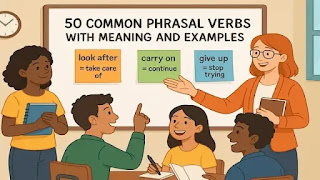What are the 50 Phrasal Verbs with Meaning and Examples?


Example of Modal Verb Modal verbs are an essential part of English grammar, but they can be confusing if you’re not familiar with how they work. Whether you’re asking for permission, making a suggestion, or talking about possibilities, modal verbs help express various shades of meaning in your sentences. In this guide, we’ll break down modal verbs in a simple way, complete with examples to make it easy to understand and use them in daily conversations.
Modal verbs are special auxiliary verbs that help convey mood, ability, permission, possibility, or obligation. Unlike regular verbs, modal verbs don’t need to be conjugated (no need to change based on who’s doing the action), and they’re always followed by the base form of the verb. Some common modal verbs include:
Each of these modals has a specific purpose, and they help add meaning to your sentences beyond just what the main verb conveys.
Can is one of the most frequently used modal verbs. It shows someone’s ability to do something, indicates that something is possible, or asks for permission.
Ability:
Possibility:
Permission:
Could is the past form of can, but it’s also used for polite requests or when talking about possible outcomes in hypothetical scenarios.
Past Ability:
Polite Requests:
Hypotheticals:
May is often used in formal contexts and can be used to express both permission and possibility.
Possibility:
Permission:
Might suggests a lower possibility than may. It’s often used when we’re less sure about something happening.
While may and might can sometimes be used interchangeably, might tends to express a smaller chance of something happening.
Must is a powerful modal verb. It’s used to talk about something that is necessary or to express a strong assumption about something.
Necessity:
Strong Assumption:
Shall is more formal and is typically used to discuss future actions, often in British English. It can also be used when offering to do something for someone or asking for opinions.
Future Intentions:
Making Offers:
Should is the modal verb we use when giving advice, recommendations, or discussing what’s expected.
Advice:
Expectation:
Will is one of the most common ways to talk about future events or decisions that you make on the spot.
Future Plans:
Instant Decisions:
Would is versatile and is used to talk about hypothetical situations, past habits, or polite requests.
Politeness:
Hypothetical Situations:
Past Habits:
Using the wrong modal verb:
Incorrect verb form after a modal verb:
Using two modals together:
A modal auxiliary verb, or simply a modal verb, is a type of helping verb that expresses necessity, ability, permission, or possibility. These verbs are crucial in conveying the speaker's mood or attitude towards the action of the main verb. Unlike regular verbs, modal verbs remain unchanged regardless of the subject and are always followed by the base form of the main verb. Some common examples include can, could, may, might, must, shall, should, will, and would.
For instance:
In English, there are nine primary modal auxiliary verbs:
Each modal verb serves a specific purpose, helping to convey various nuances in meaning. Understanding these modal verbs is essential for accurately expressing ability, obligation, permission, and possibility in both spoken and written communication.
Modal verbs are crucial for expressing a range of meanings in English, from ability and permission to advice and obligation. Mastering them will help you communicate more effectively in both spoken and written English. As you practice, try using these modal verbs in your daily conversations and see how they can add depth and clarity to what you’re saying. For more tips on improving your English, visit our blog and dive deeper into the nuances of the language.
Comments
Post a Comment
Please Don't Enter Any Spam Link In The Comment Box.